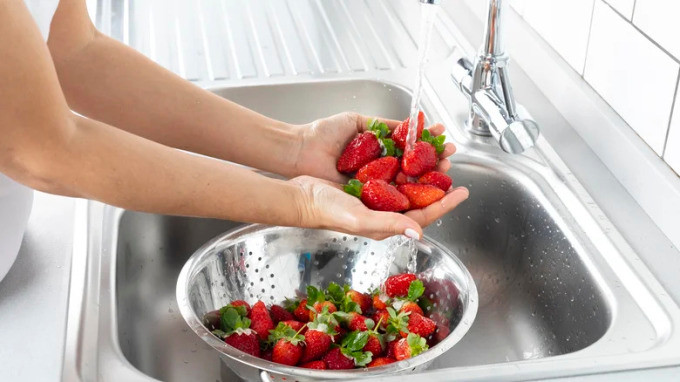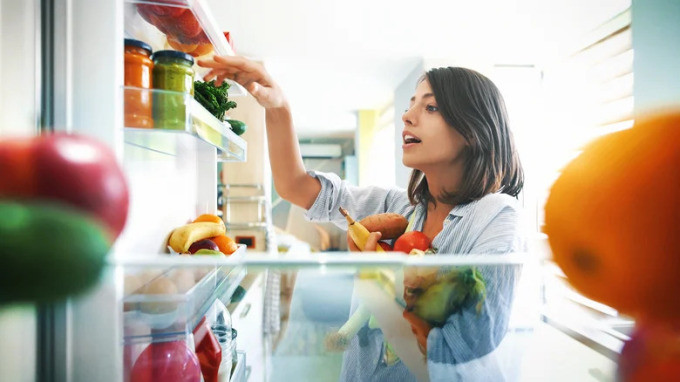Many people make common mistakes when storing fruit, such as setting the wrong temperature and humidity, washing too soon, or storing fruit next to each other.
Proper storage is especially important for fruit, as it can quickly become moldy or overripe and end up in a landfill. Here are some of the most common mistakes:
Wash too soon

Strawberries are berries, washing them first will only make them spoil faster if not dried (Photo:Dailymeal)
When you wash fruit, especially berries, before they are fully ripe or just before storing, you are "pumping" moisture into them. Excess moisture, if not completely dried out, creates the perfect environment for mold and bacteria to grow.
For fruits that are susceptible to mold, you should not wash them until you eat them, this will reduce the risk of mold, and also help remove fruits that are showing signs of damage, preventing the spread to the remaining fruits. When you buy them, just wipe them gently to remove dirt. Or if you want to wash them first, you should put them in a salad spinner to absorb all the water, then store them in a perforated, breathable bag.
Keep fruits close together
Fruits such as ripe bananas, apples, avocados, pears, tomatoes and peaches produce ethylene, a gas that speeds up the ripening process. Storing them near other fruits, especially those sensitive to ethylene such as asparagus, raspberries, mangoes and oranges, will hasten the ripening and spoiling of these fruits.
It is best to store compatible fruits together. If they all contain ethylene, it is safest to store them close together so as not to affect the other fruits.
In addition to the effects of ethylene, some fruits can give off odors when placed too close to other fruits. For example, the scent of jackfruit and oranges can easily transfer to other fruits.
Inappropriate packaging
Many people often put the fruit they buy in the refrigerator without realizing that the original packaging does not have enough space for the fruit to breathe, which can lead to moisture buildup and mold. In addition, the packaging from the store can be dirty.
Instead, consider choosing airtight, reusable containers made of glass or BPA-free plastic to maintain freshness. Plastic zip-top bags with small holes can also prevent mold and moisture by allowing air to circulate.
Cut fruit too early
Once cut, fruit immediately loses its freshness due to exposure to oxygen and bacteria. Fruits with high water content such as melons, citrus and berries are particularly susceptible to spoilage after cutting because the high humidity creates the perfect environment for bacteria and mold to grow, even when stored in the refrigerator.
There is also the issue of fruit turning brown due to oxidation. Some fruits like avocados, apples and bananas are more susceptible to oxidation after being cut. They are best eaten soon.
Not knowing how to use water when needed
Some fruits can be preserved in water to retain their crispness and freshness. When you cut an apple, pear, or avocado, storing it in water can help retain moisture and prevent browning without sacrificing flavor.
Other varieties like grapefruit, lemons and oranges, and cucumbers thrive with extra moisture. If you don't want to refrigerate them, you can keep them in a bowl of water outside, with the water changing daily.
Forget FIFO
FIFO stands for "First In, First Out" which means rotating food to ensure that the items purchased first are used first before the items purchased later. This is important because it maintains freshness and helps you eat them before they spoil. This can also help keep your refrigerator neat and tidy. Periodically check the fruit storage area and label it with the purchase date so you can eat them as soon as possible.

Eat pre-purchased foods early (Photo:Dailymeal)
Dirty refrigerator
Fruit isn’t the only food that should be in your fridge, and regular cleaning can help keep all foods fresher for longer. A dirty, food-filled fridge can speed up the ripening and rotting process of fruit. Most importantly, a clean fridge helps eliminate germs and bacteria that can contaminate fruit, while minimizing the risk of cross-contamination from other foods.
Do not leave fruit outside
Some fruits need to be refrigerated, but not all. For example, pineapples take a long time to ripen after harvest, and refrigeration won’t make a difference. Refrigeration can also affect the flavor and texture, especially tomatoes. So leave them at room temperature, and only refrigerate them when they’re overripe, or you’ve cut them.
Stone fruits such as peaches, plums and cherries, apples and pears also do better at room temperature. Putting them in the fridge can be a bad idea, especially before they are ripe, as this can cause them to become mushy and lose their flavour.
According to VnExpress